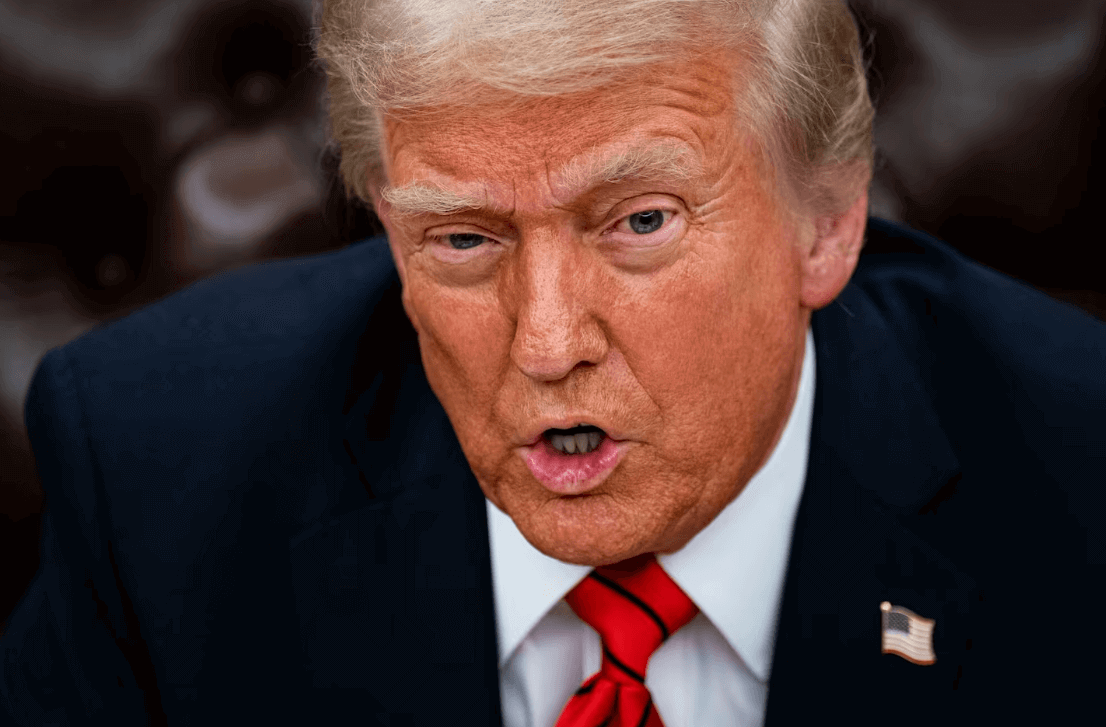法官裁定白宫未遵守法院命令

【中美创新时报2025 年 2 月 11 日编译讯】(记者温友平编译)一名联邦法官周一表示,白宫违抗了他下令发放数十亿美元联邦拨款的命令,这是法官首次明确宣布特朗普白宫违反司法命令。《纽约时报》记者Mattathias Schwartz对此作了下述报道。
罗德岛联邦法院法官 John J. McConnell Jr. 的裁决要求特朗普政府官员遵守他所谓的 1 月 29 日发布的法令的“明文”。
他写道,这项命令“明确无误,被告遵守该命令没有任何障碍”。
裁决后不久,政府律师就其最初的命令向美国第一巡回上诉法院提出上诉,要求上诉法院暂停麦康奈尔的命令,在审理他们的案件期间保持联邦资金流动。白宫对此作出了坚决回应。
“每一项行政命令都会在法庭上生效,因为特朗普-万斯政府的每一项行动都是完全合法的,”白宫发言人哈里森·菲尔兹说。“任何针对它的法律挑战都只不过是试图破坏美国人民的意愿。”
周一的法律行动标志着朝着可能迅速演变为行政和司法部门之间高风险对决的一步迈出了一步,而就在前一天,副总统 JD Vance 在社交媒体上发帖称“法官无权控制行政部门的合法权力”。公然拒绝遵守司法部门的宪法监督权可能会被视为一场宪法危机。
菲尔兹的声明暗示总统最终会在法庭上获胜,但他和司法部都没有说明白宫在此期间会做什么。看来,政府将试图通过法律系统的既定程序来取胜,即使官员及其盟友从外部质疑这些程序的合法性。
为此,唐纳德·特朗普总统的一些盟友指责法官对特朗普的裁决超越了他们的权限。
“激进的法官必须停止非法干涉总统的第二条权力,”保守派倡导组织第三条项目的负责人迈克·戴维斯写道。
推动大部分法律反击的民主党总检察长坚持自己的立场。
“没有任何政府可以凌驾于法律之上,”加州总检察长罗布·邦塔在命令发布后不久发表声明称。“特朗普政府必须完全遵守法院的命令。”
目前,已有 40 多起针对特朗普政府的诉讼,质疑特朗普的无耻举动,包括撤销出生公民权和让埃隆·马斯克的团队访问敏感的财政部支付系统。法官裁定,许多行政行动可能违反现有法规。周一,联邦法官持续对特朗普的权威提出质疑,暂时阻止特朗普政府削减健康研究补助金,并暂停劝说联邦雇员辞职的努力。
华盛顿面临的问题是,特朗普将如何回应。
“总统不遵守命令的情况非常罕见,”乔治城大学国会与民主法律中心主任维多利亚·诺尔斯 (Victoria Nourse) 说,她曾在乔·拜登担任副总统期间担任总法律顾问。“这是特朗普总统似乎在宣扬他不具备的权威的模式的一部分。”
麦康奈尔此前曾下令白宫解冻联邦资金,这些资金被白宫管理和预算办公室的一份备忘录冻结,该备忘录要求冻结数十亿美元的联邦拨款,直到它们被确定符合特朗普的优先事项,包括通过意识形态试金石。
周五,22 名民主党总检察长向麦康奈尔提出指控,指责白宫未能遵守他先前的命令。司法部在周日的一份文件中回应称,《通胀削减法案》和两党基础设施法案分配给各州的清洁能源项目和交通基础设施资金不受最初命令的约束,因为这些资金是根据另一份备忘录暂停的,而不是引发诉讼的备忘录。
麦康奈尔周一的裁决明确驳回了这一论点。
法官批准了总检察长提出的“强制执行动议”请求——本质上是一种推动。它没有裁定特朗普政府藐视法庭,也没有规定任何不遵守规定的处罚。
然而,法官直截了当地发现,他于 1 月 29 日发布的初步临时限制令并未得到遵守。
“这些资金暂停违反了临时限制令的明文规定,”麦康奈尔写道。此前的裁决要求政府不得“暂停、冻结、阻碍、阻止、取消或终止”国会拨给各州用于支付医疗补助、学校午餐、低收入住房补贴和其他基本服务的资金。
法官还明确表示,无论白宫官员认为案件结果如何,他们都有义务遵守。在周一的裁决中,法官引用了另一起不相关案件的意见,指出“私下决定法律并拒绝服从命令的人通常会面临藐视法庭罪的风险,即使命令最终被裁定为不正确。”
加州大学洛杉矶分校法学院教授亚当·温克勒表示,如果麦康奈尔发现政府仍在无视他的初步命令,他可能会命令诉讼中提到的十几名政府官员解释为什么他们不应该藐视法庭,然后对他们处以监禁,或者更有可能的是,由他们的机构支付罚款。
“你不太可能把一个机构的部长关进监狱,”他说,“但你可以。”
这场摊牌是特朗普反对者为让国会批准的资金再次流动而做出的更广泛努力的一部分。哥伦比亚特区法官洛伦·阿里汗上周一发布了另一项要求释放有争议资金的命令。该案件是由民主前进组织代表的非营利组织联盟提起的。
民主前进组织首席执行官斯凯·佩里曼表示,如果行政部门和司法部门之间出现僵局,她希望立法部门能够介入。
“这确实呼吁国会采取行动,”她说。“司法部门无法独自阻止这种非法和极端的行政权力使用。”
解冻联邦拨款的命令至少得到了部分遵守,但很难判断资金被冻结的地方。各州已重新获得允许他们报销医疗补助的门户网站的访问权限。但乔治城大学法学院教授大卫·A·苏珀表示,他直接从政府内外的一些团体那里听说,他们的资金仍被冻结。
“毫无疑问,政府没有遵守命令,甚至没有接近遵守命令,”苏珀说。“即使是命令发布前未被冻结的资金现在也被冻结了。”
苏珀说,麦康奈尔似乎正试图一步一步地处理此事。
“如果你或我这样做,法官的书记员会在电话里说,带上你的牙刷来听证会,说明原因,因为你今晚可能回不来了,”他说。“这是联邦政府,所以法官试图表现出克制——表达愤怒并重申其命令,但没有立即提出处罚。”
这种反抗可能超出了国内资金冻结的范围。在周一提交的另一份文件中,另一起针对特朗普政府的诉讼的原告表示,特朗普政府仍在让美国国际开发署的员工休行政假,违反了法院命令他们停止这样做。
本文最初发表在《纽约时报》上。
题图:特朗普总统。Al Drago/彭博社
附原英文报道:
Judge rules the White House failed to comply with court order
By Mattathias Schwartz New York Times,Updated February 11, 2025
President Trump.Al Drago/Bloomberg
A federal judge Monday said the White House has defied his order to release billions of dollars in federal grants, marking the first time a judge has expressly declared that the Trump White House was disobeying a judicial mandate.
The ruling by Judge John J. McConnell Jr. in Rhode Island federal court ordered Trump administration officials to comply with what he called “the plain text” of an edict he issued on Jan. 29.
That order, he wrote, was “clear and unambiguous, and there are no impediments to the Defendants’ compliance with” it.
Shortly after the ruling, administration lawyers appealed his initial order to the 1st U.S. Circuit Court of Appeals, asking the appellate court to pause McConnell’s order to keep federal funds flowing while their case was being considered. The White House responded defiantly.
“Each executive order will hold up in court because every action of the Trump-Vance administration is completely lawful,” said Harrison Fields, a White House spokesperson. “Any legal challenge against it is nothing more than an attempt to undermine the will of the American people.”
The legal actions on Monday marked a step toward what could evolve quickly into a high-stakes showdown between the executive and judicial branches, a day after a social media post by Vice President JD Vance claimed that “judges aren’t allowed to control the executive’s legitimate power.” An outright refusal to comply with the judicial branch’s constitutional oversight authority could be considered a constitutional crisis.
Fields’ statement suggested that the president would ultimately prevail in court, but neither he nor the Justice Department said what the White House would do in the meantime. It appeared that the administration would try to win through the legal system’s established procedures, even as officials and their allies question the legitimacy of those procedures from the outside.
To that end, some of President Donald Trump’s allies accused the judges ruling against Trump of overstepping their authority.
“Activist judges must stop illegally meddling with the President’s Article II powers,” wrote Mike Davis, who heads the Article III Project, a conservative advocacy group.
The Democratic attorneys general driving much of the legal pushback pressed their position.
“No administration is above the law,” Rob Bonta, the attorney general of California, said in a statement shortly after the order. “The Trump administration must fully comply with the court’s order.”
Already, more than 40 lawsuits have been filed against the Trump administration challenging Trump’s brazen moves, which have included revoking birthright citizenship and giving Elon Musk’s teams access to sensitive Treasury Department payment systems. Judges have ruled that many of these executive actions may violate existing statutes. On Monday, federal judges maintained a steady flow of challenges to Trump’s authority, temporarily blocking the Trump administration from reducing health research grants and maintaining a stay on efforts to coax federal employees to quit.
The question looming over Washington is, how Trump will respond.
“It’s very rare for a president not to comply with an order,” said Victoria Nourse, the director of the Georgetown Law Center on Congress and Democracy, who was formerly Joe Biden’s general counsel during his years a vice president. “This is part of a pattern where President Trump appears to be asserting authority that he doesn’t have.”
McConnell previously ordered the White House to unfreeze federal funds locked up by a memo from the White House Office of Management and Budget that demanded that billions of dollars in federal grants be held back until they were determined to comply with Trump’s priorities, including with ideological litmus tests.
On Friday, 22 Democratic attorneys general went to McConnell to accuse the White House of failing to comply with his earlier order. The Justice Department responded in a filing on Sunday that money for clean energy projects and transportation infrastructure, allocated to states by the Inflation Reduction Act and the bipartisan infrastructure bill, was exempt from the initial order because it had been paused under a different memo than the one that prompted the lawsuit.
McConnell’s ruling on Monday explicitly rejected that argument.
The judge granted the attorneys general’s request for a “motion for enforcement” — essentially a nudge. It did not find that the Trump administration was in contempt of court or specify any penalties for failing to comply.
However, the judge was straightforward in his finding that an initial temporary restraining order that he issued Jan. 29 was not being followed.
“These pauses in funding violate the plain text of the TRO,” McConnell wrote. That earlier ruling ordered the administration not to “pause, freeze, impede, block, cancel, or terminate” money that had been allocated by Congress to the states to pay for Medicaid, school lunches, low-income housing subsidies and other essential services.
The judge also made clear that White House officials were obligated to comply regardless of how they thought the case might conclude. In his ruling Monday, the judge quoted an opinion from an unrelated case noting that “persons who make private determinations of the law and refuse to obey an order generally risk criminal contempt even if the order is ultimately ruled incorrect.”
Going forward, if McConnell finds that the government is still ignoring his initial order, he could order more than a dozen administration officials named in the lawsuit to explain why they should not be held in contempt of court, and then punish them with imprisonment, or, more likely, fines paid by their agencies, according to Adam Winkler, a professor at UCLA School of Law.
“It’s unlikely you can put the secretary of an agency in jail,” he said, “but you can.”
The showdown is part of a broader effort by Trump’s opponents to get congressionally approved funding flowing again. Another order requiring that the disputed funds be released was issued last Monday by Judge Loren AliKhan of the District of Columbia. That case was filed by a coalition of nonprofits represented by Democracy Forward.
Skye Perryman, Democracy Forward’s CEO, said that if there were to be a standoff between the executive and judicial branches, she hoped that the legislative branch would step in.
“That is really a call to action for Congress,” she said. “The judicial branch is not going to be able to stop this unlawful and extreme use of executive power on its own.”
Compliance with the orders to unfreeze federal grants is at least partial, but it is difficult to gauge where funds remain stuck. The states have regained access to portals that allow them to be reimbursed for Medicaid. But David A. Super, a professor at Georgetown Law, said that he had heard directly from a number of groups, both inside and outside of government, that said their funding was still frozen.
“There’s no question that the government is not complying, has not even come close to complying, with the order,” Super said. “Even funds that weren’t frozen before the order are being frozen now.”
Super said McConnell appeared to be trying to take the matter one step at a time.
“If you or I did this, the judge’s clerk would be on the phone saying bring your toothbrush to the hearing to show cause because you might not be coming home tonight,” he said. “This is the federal government, so the judge is trying to show restraint — expressing anger and reiterating its order, but not immediately bringing up penalties.”
The defiance may go beyond the domestic funding freeze. In another Monday filing, plaintiffs in a different lawsuit against the Trump administration said that the administration was still putting employees of the U.S. Agency for International Development on administrative leave, against a court order that ordered them to stop.
This article originally appeared in The New York Times.

